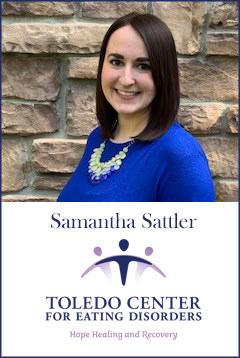Eating disorders are serious but treatable mental illnesses that can affect people of every age, sex, gender, race, ethnicity, and socioeconomic group. No one knows exactly what causes eating disorders, but a growing consensus suggests that a range of biological, psychological, and sociocultural factors are involved. 9 percent of Americans will suffer from an eating disorder in their lifetime. Eating disorders are one of the deadliest mental illnesses, second only to opioid overdose.
NAMI Toledo’s blog asked Samantha Sattler, LPCC, the Clinical Director at the Toledo Center for Eating Disorders, several questions about eating disorders as a mental health problem. Samantha has a bachelor’s degree in Psychology and a master’s degree in Counseling, both from the University of Toledo, and has been working at the Toledo Center for Eating Disorders for over 10 years.
1. How serious would you say eating disorders are as a mental illness?
Eating Disorders are quite serious as they impact an individual from all fronts: mentally, emotionally, and physically. Anorexia specifically is recognized as the deadliest of all psychiatric disorders, and mortality rates for Bulimia and OSFED (Other Specified Feeding and Eating Disorder) also remain high.
2. How would you fit eating disorders in with other mental illnesses?
Eating disorders can be connected to many other mental diagnoses as co-morbidity is high. Unlike other mental illnesses, eating disorders often get glamorized. Our society’s views on beauty, health, weight, and shape are often inappropriately portrayed and stressed in the media. This in turn can lead to individuals who are struggling with their own body image and self-esteem to make decisions that can ultimately take them down a disordered path.
3. Are there cases of dual diagnosis, where someone suffering from an eating disorder also suffers from another mental illness? Describe
Absolutely. In fact, in my experience this tends to occur more often than not. Depression and anxiety are most commonly seen in addition to one’s eating disorder, however at the Toledo Center for Eating Disorders we have worked with a plethora of dual diagnosis cases, including OCD (Obsessive-Compulsive Disorder), PTSD (Post-Traumatic Stress Disorder), substance use/abuse issues, and personality disorders to name a few.
4. Have we made any progress on treating eating disorders in the past 15 years?
Thankfully, yes. Awareness about eating disorders has increased, research has continued to develop and expand, and the stigma surrounding these illnesses has started to decrease with better education and treatment availability. Different types of eating disorders are also coming to the forefront and our understanding of such diagnoses are increasing (i.e. ARFID – Avoidant Restrictive Food Intake Disorder).
a. Is medication involved, or therapy, or both?
Many times [treatment for an eating disorder] will include both therapeutic and medical intervention as eating disorders do impact an individual mentally, emotionally, and physically as stated above. It is important that the treatment team involved includes the necessary parties, including but not limited to, a therapist, psychiatrist, medical doctor, and dietitian.
5. Is stigma an issue with respect to eating disorders? How?
There is a LOT of stigma surrounding eating disorders. A few examples include beliefs that eating disorders are only experienced by women, that eating disorders are a choice and therefore easily stopped, that eating disorders are purely focused on body image and weight, that eating disorders only include extremely thin body types, that those struggling with an eating disorder are just seeking attention, etc. Sadly, the list could go on and on, but as mentioned previously, eating disorder specialists are all working to remove such misconceptions.
6. Tell us anything else we should know about eating disorders
Eating disorders (even individuals struggling with the same diagnosis) are not cookie cutter and they should be approached with an individualized treatment plan created to best fit that person’s needs. With appropriate intervention and treatment, full recovery from an eating disorder is possible!
a. And if there is anything specific to women and girls you would like to highlight?
I would like to highlight that women/men/transgender individuals of all ages, races, ethnicities, and socioeconomic statuses can struggle with an eating disorder. Regardless of the client’s presentation, I would just stress that anyone who is struggling does not have to do so alone – help is out there! If anyone is currently struggling and seeking treatment, please contact the Toledo Center for Eating Disorders and our wonderful intake team can assist you.
Helpful Links

